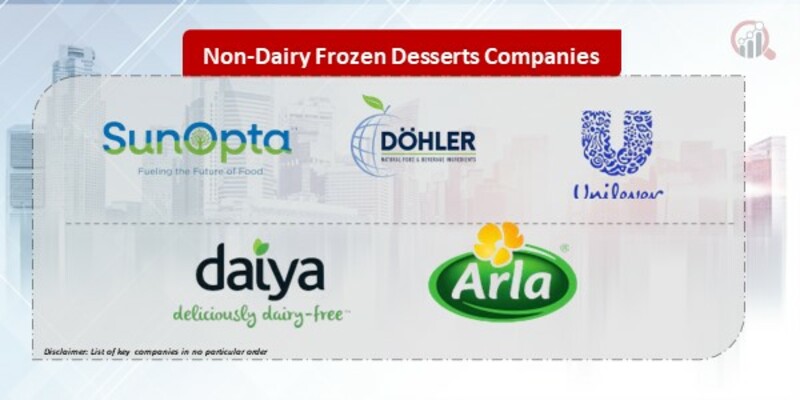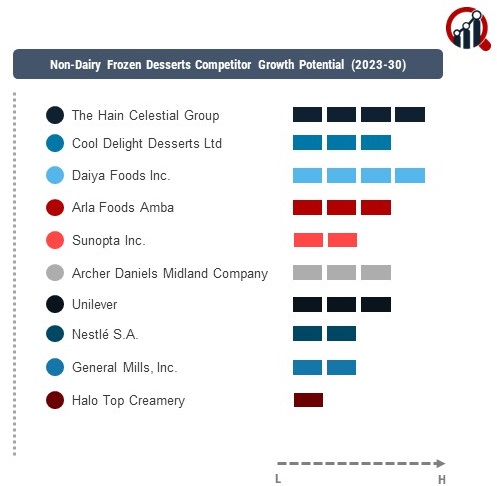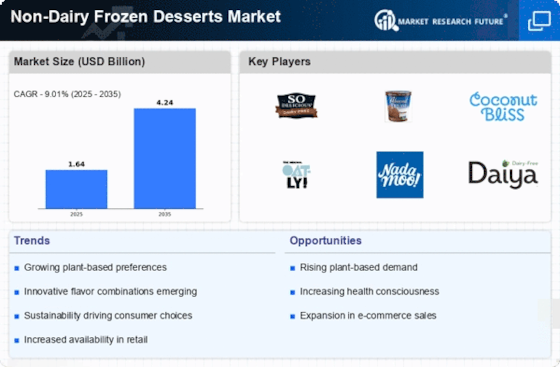Top Industry Leaders in the Non-Dairy Frozen Desserts Market

The non-dairy frozen desserts market has experienced substantial growth, driven by increasing consumer demand for plant-based and lactose-free alternatives. The competitive landscape of this market is marked by a mix of established players and emerging companies, each contributing to the expansion and diversification of the non-dairy frozen desserts segment.
Key Players:
The Hain Celestial Group (US)
Halo Top Creamery (US)
Sunopta Inc. (Canada)
Cool Delight Desserts Ltd (UK)
General Mills, Inc. (US)
Daiya Foods Inc. (Canada)
Archer Daniels Midland Company (US)
Nestlé S.A. (Switzerland)
Arla Foods amba (Denmark)
Unilever (UK)
Strategies Adopted:
The non-dairy frozen desserts market deploy various strategies to navigate the competitive landscape. Product innovation is central to their approach, with companies constantly introducing new flavors, formulations, and formats to appeal to diverse consumer tastes. Strategic partnerships with ingredient suppliers ensure a reliable source of high-quality plant-based ingredients, enhancing the taste and texture of non-dairy frozen desserts. Marketing efforts often focus on the health and sustainability aspects of non-dairy alternatives, targeting health-conscious and environmentally aware consumers.
Market Share Analysis:
The non-dairy frozen desserts segment involves considering several key factors. Brand recognition and consumer loyalty play a pivotal role, with consumers often gravitating toward non-dairy frozen desserts from well-established and reputable companies. Distribution networks and collaborations with retailers significantly contribute to market share, ensuring that non-dairy frozen desserts are widely available and accessible. Pricing strategies, taste profiles, and responsiveness to regional preferences also play a crucial role in influencing market share dynamics in the competitive non-dairy frozen desserts market.
News & Emerging Companies:
The non-dairy frozen desserts market has witnessed the emergence of new players responding to the surging popularity of plant-based diets. Start-ups such as Eclipse Foods and Brave Robot have entered the market, offering innovative non-dairy frozen dessert options with a focus on unique ingredients and sustainability. These emerging companies contribute to the diversification of the non-dairy frozen desserts segment, introducing novel products and catering to niche markets with specific preferences for artisanal and locally sourced non-dairy frozen desserts.
Industry Trends:
The non-dairy frozen desserts market reflect the evolving landscape of consumer preferences and the emphasis on innovation and sustainability. Key players are actively investing in research and development to create new non-dairy frozen dessert formulations that align with evolving dietary trends, such as gluten-free, nut-free, and allergen-friendly options. Investments in sustainable packaging practices are gaining prominence, aligning with the increasing consumer demand for environmentally conscious frozen dessert products. Additionally, companies are exploring digital marketing strategies and e-commerce channels to enhance their market reach and adapt to changing consumer shopping behaviors in the non-dairy frozen desserts segment.
Competitive Scenario:
The non-dairy frozen desserts market is dynamic, with companies continually adapting to changing consumer preferences and market trends. The focus on health, sustainability, and indulgent taste experiences has intensified competition, prompting companies to highlight the quality and ethical aspects of their non-dairy frozen dessert products. The battle for freezer space in supermarkets and collaboration with foodservice establishments further heightens the competitive landscape, leading companies to differentiate themselves through marketing, branding initiatives, and a commitment to providing non-dairy frozen dessert options that meet the evolving needs of consumers.
Recent Development
The non-dairy frozen desserts market witnessed a significant development. Ben & Jerry's announced the expansion of its non-dairy ice cream range with the introduction of a limited-edition collaboration flavor featuring popular plant-based ingredients. This move aimed to capitalize on the growing trend of co-branded and exclusive flavors, enhancing Ben & Jerry's position as a leader in the non-dairy frozen desserts market. So Delicious Dairy Free launched a new line of indulgent frozen desserts with a focus on minimizing environmental impact, utilizing sustainable sourcing practices for key ingredients.
Häagen-Dazs unveiled a new marketing campaign highlighting its commitment to using premium and globally sourced non-dairy ingredients in its frozen desserts. NadaMoo! collaborated with a renowned chef to create a series of unique non-dairy ice cream flavors, leveraging culinary expertise to differentiate its offerings. Talenti invested in advanced freezing technology to enhance the texture and creaminess of its non-dairy gelato range, aiming to set new standards in the non-dairy frozen desserts market. These developments underscore the competitive nature of the non-dairy frozen desserts market, with companies actively innovating and adapting to meet evolving consumer expectations and secure their positions in this dynamic and plant-based industry.












